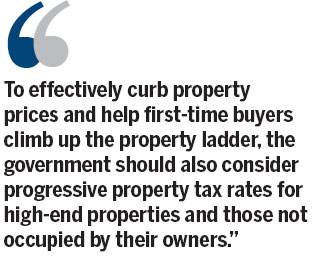'3-D' stamp duties hit the spot
Updated: 2013-08-29 06:36
By Qiu You(HK Edition)
|
|||||||
With the increasing heat generated by the so-called "3-D" punitive stamp duties against many property investors and speculators, many real estate agents as well as property developers have joined the chorus of condemnation against these measures that have dampened the property market to a depressing level. Apart from taking to the street to decry these punitive measures, they have a trump card up their sleeve - threatening to block the passage of the two stamp duty bills at the Legislative Council (LegCo) in October unless the government caves in to their demand of toning down the measures.
The "3-D" stamp duties are namely Special Stamp Duty (SSD), Buyer's Stamp Duty (BSD) and Double Stamp Duty (DSD). SSD, introduced in September 2010, refers to punitive stamp duties ranging from 10 to 20 percent on properties changing hands within three years of purchase. BSD announced last October, is a levy of 15 percent on home purchases by companies and non-permanent residents. DSD is the doubling of stamp duty in February this year to 8.5 percent from the previous 4.25 percent on purchases of all properties valued at HK$2 million or above for those who are not first-time buyers.
These heavy doses, aimed at curbing speculation and cooling the red-hot market by shutting mainlanders out of it, surely hit the mark to a certain extent. Indeed, the combination of these punches has achieved the impact of frightening off some mainland buyers and investors.

The official figures showed for the first five months of this year, home purchases by non-local buyers and companies plunged to a monthly average of 249 deals from 1,089 homes brought every month from January to October last year, down from 13.6 percent of total transactions to 4.6 percent. In addition, property transactions in the city have dropped to a historic low close to during SARS in 2003 with only about 39,000 deals. Some real estate agencies have already warned of staff layoffs and shutting down 10 percent to 20 percent of branches. Not just estate agencies and property developers, but also decoration and interior design companies have been hard hit.
It is no wonder why the stakeholders are all whining about it with their LegCo representatives threatening to veto the bills on BSD and DSD and counter-offering some watered-down amendments. They include exempting firms owned by permanent residents from the BSD with the conditions to restrict the transfer of company shares, exempting corporate buyers from the DSD and imposing a sunset clause to end the measures in one to two years.
While I have deep sympathy for those whose livelihoods are greatly affected by these draconian measures, I can hardly agree that the government should withdraw the measures at this moment or cave in to their demand. More important, it is vital for those LegCo members to refrain from allowing sectoral interest to prevail over the overall interest of Hong Kong residents. Their votes should not be a political tool for them to extort self-benefit at the expense of the latter.
If the two bills are vetoed at LegCo or the government is forced to give in to the amendments which would effectively cripple the measures, the consequence will be disastrous. First of all, it sends the wrong message that the government is not determined to cool down the property market. To do so may in turn actually fuel the bubble craze as this will invite an increasing influx of mainland buyers to snap up properties in the city. If the government easily backs down on their demand, no one will believe it is capable of stabilizing the roaring property market. In the end, speculators will become even more ferocious to pounce on the property market, jacking up prices and rents to an even more unbearable level. By then, there will be a much greater risk of a bubble burst and the market will become highly volatile.
That said, it doesn't mean that there is no room for review. After all, the DSD may deter corporate buyers from expanding their business in the city and home buyers who just want to change to a better house. To effectively curb property prices and help first-time buyers climb up the property ladder, the government should also consider progressive property tax rates for high-end properties and those not occupied by their owners. Over-dependence on the existing measures may be counter-conducive to the market's healthy development.
The author is a current affairs commentator.
(HK Edition 08/29/2013 page9)